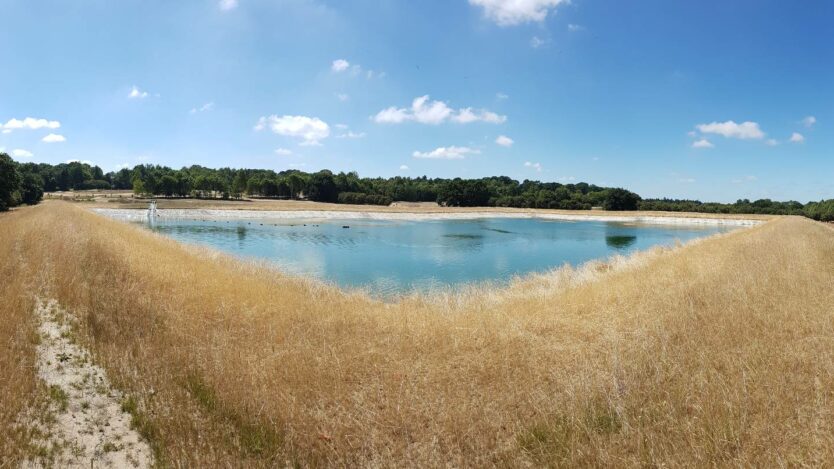Never mind the cost-of-living crisis, golf courses need to look for ways to mitigate an unprecedented cost-of-water crisis which could catch many unprepared, says Shaun Anderson, Rain Bird’s Golf Sales Specialist for the UK, Ireland and Iceland.
This article is part of GCMA Insights – topical content for golf industry professionals, discussing the things that matter to those who work in golf clubs.
What’s needed is an urgent reset. Every golf course should put a water management plan in place for next season and for the medium and longer term. Being proactive, not reactive, with irrigation means solving problems before they become major issues, causing costs to spiral.
We all know water is a finite resource yet, for decades, particularly in the UK, courses have relied on plentiful rainfall, supplemented by extraction from lakes and boreholes. We haven’t taken water management as seriously as we should have.
Extreme summer temperatures in recent years and increasingly dry conditions all year-round have seen reservoirs and rivers reduced to very low levels and in some areas dry up completely. Golf course irrigation found itself in sharp focus this year when members of the public, affected by water restrictions in the area raised objections to turf being watered.
The ideal solution is an effective cost-based and data-led sustainable irrigation strategy for measuring and applying water efficiently.
Get involved in the debate.
To join the GCMA, click here, or to organise a call with a member of the GCMA team, just complete the form below.
So, if this is the aim, what challenges stand in the way?
Course irrigation is more complex than it looks, involving a costly combination of equipment, products, people, water and energy. Maintaining high quality playing surfaces without wasting water, energy or nutrients, should be every venue’s priority. Only apply what the plant needs – understand your surfaces and irrigation required to replenish the soil moisture deficit and achieve the ideal volumatic water content (VWC). Irrigating in this fashion demonstrates a commitment to a more sustainable approach to turf management.
Security of water supply
Is there a backup plan should something happen to your water source? An emergency operating plan is often in place in other workplace settings so check your course has a robust one.
Irrigation system performance
Having a detailed understanding of the potential of any irrigation system and controls in place is a good place to start. Getting the most from the system today means revisiting control settings and performing regular, routine system maintenance. Many systems have features that are either not being used or fully exploited, with software providing data that informs, so make sure you find out what their full capabilities are. If the software is working hard, staff time, and more importantly, staff expertise, can be given over to other priorities and concerns.

Water and power consumption
With uncertainties about rising energy costs, every business needs robust metrics in place to monitor costs regularly. Measure water usage and electricity consumption and understand what it actually costs to power any irrigation systems. Being on top of figures will help when working out where further efficiencies could be made when it comes to watering regimes or irrigation processes.
Maintenance and system upgrades
A planned and scheduled approach to preventative maintenance and replacement of any part of an irrigation system means thinking ahead, not simply reacting when something breaks down. A proactive approach may require investment but could prolong the life of the existing system or improve its performance with phased upgrades, without digging everything up and starting again. Even small changes make a real difference and new technologies can now be integrated easily into many older systems to deliver cost savings which can then help to fund future upgrades.
WHY JOIN THE GCMA?
Membership of the GCMA unlocks a network of like-minded professionals, provides you with support in your professional and personal development, and provides you with a multitude of benefits. Whether that’s the tools that will help you to excel in your profession, or a wide range of services to support your wellbeing, signing up to the GCMA is joining a community.
New technology efficiencies
Irrigation practice has changed significantly as technology has advanced. Rain Bird systems are reactive, in real-time, responding to changing weather conditions. Designed to be intuitive and easy to use, greenkeeping staff can save hours, making adjustments on a rotor-by-rotor basis from anywhere through a mobile interface.
“We have an abstraction allowance of 20000m3 and were using close to this every year previously. What has utterly amazed me is that we now use less water, despite adding fairway irrigation. We used 6000m2 less last year compared to the last year of the old system.”
– Matt Aplin, Course Manager, Goring and Streatley Golf Club.
Best practice for cost reduction
Having understood the operational capability and performance of the current system, turning attention to best practice offers potential for future cost efficiencies, assessing where and when watering is required for different circumstances, for example, when applying fertiliser or wetting agents. Identify the areas of most importance that need the most attention and closely control moisture levels. A precise and scientific approach to irrigation means prioritising watering, reducing overwatering and driving down any associated costs.
If tackling all or any one of these challenges seems daunting, remember that manufacturers, professional irrigation consultants and contractors are there to help.
Full GCMA members can register for a free irrigation evaluation as an exclusive member benefit – for details, click here.
Pictures courtesy of Rain Bird and MJ Abbott.
This article is part of GCMA Insights – topical content for golf industry professionals, discussing the things that matter to those who work in golf clubs.
Get involved in the debate. To join the GCMA, click here, or to organise a call with a member of the GCMA team, just complete this form and we’ll be in touch!



